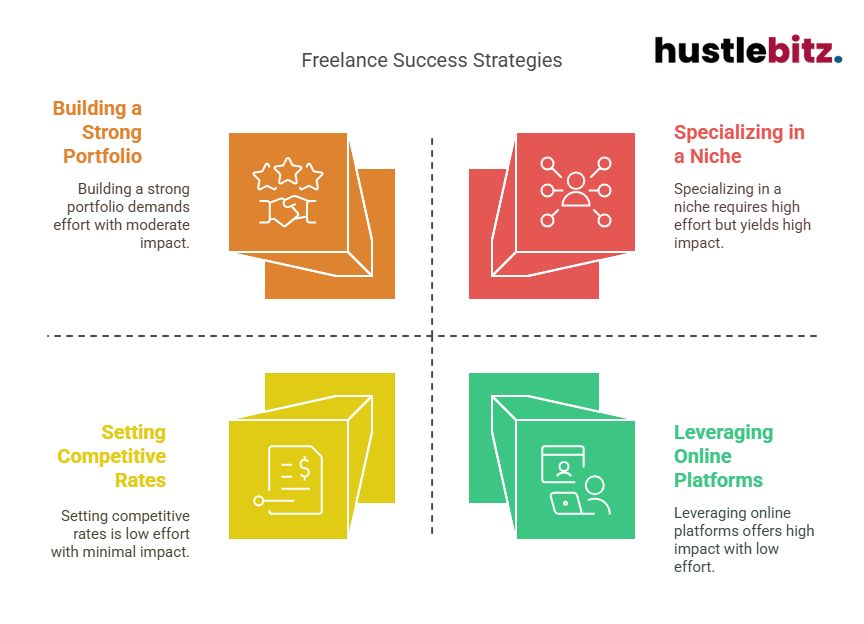In today’s dynamic job market, the gig economy empowers freelancers with unparalleled flexibility and remote work options. To thrive, freelancers should identify and hone their marketable skills through online courses and strategic networking. Building a strong professional brand with an impressive portfolio and active social media presence is crucial. Securing freelance opportunities requires proactive efforts on specialized platforms such as Upwork and Fiverr, coupled with competitive rate setting based on industry research. Balancing work and personal life through effective planning and self-care practices ensures long-term success. Explore further to uncover insights on sustaining a flourishing freelance career.
Key Takeaways
- Specialize in a Niche: Concentrate on a specific market to address targeted client needs and reduce competition effectively.
- Build a Strong Portfolio: Highlight your best work and include client testimonials to showcase your expertise and attract potential clients.
- Leverage Online Platforms: Make use of specialized freelance platforms such as Upwork and Fiverr to connect with clients and secure job opportunities.
- Set Competitive Rates: Conduct thorough research on industry standards to price your services appropriately, factoring in experience and project complexity.
- Prioritize Work-Life Balance: Utilize productivity tools and establish clear boundaries to maintain focus and avoid burnout.

Understanding the Gig Economy
The gig economy, characterized by short-term contracts and freelance work as opposed to permanent jobs, has rapidly transformed the contemporary job market. This evolution has spawned significant gig economy trends, including the rise of specialized freelance platforms, the increasing allure of remote work, and the complex legal considerations freelancers must navigate.
Freelance platforms such as Upwork, Fiverr, and Toptal have become pivotal in connecting freelancers with clients. A comparative analysis of these platforms reveals distinct advantages: Upwork offers a broad spectrum of job categories, Fiverr emphasizes creative gigs, and Toptal caters to elite talent. Each platform’s unique ecosystem allows freelancers to select environments that best suit their skills and preferences.
Remote work benefits are a cornerstone of the gig economy, providing flexibility and work-life balance. Freelancers can operate from virtually anywhere, reducing overhead costs and freeing them from the constraints of traditional office settings. This geographical freedom has particularly resonated with digital nomads and those seeking a more adaptive lifestyle.
However, legal considerations for freelancers are paramount. Navigating contracts, intellectual property rights, and tax obligations necessitates a robust understanding of freelance-specific regulations. Freelancers must ensure compliance to protect themselves and their work, often requiring expert legal consultation.
Networking strategies for freelancers also play a critical role in success within the gig economy. Building a professional network through social media, industry meetups, and online communities can lead to new opportunities and collaborations. Effective networking can enhance visibility, establish credibility, and foster long-term client relationships.
Understanding these dimensions of the gig economy is essential for any freelancer aiming to thrive in today’s dynamic job market. The interplay between innovative platforms, the flexibility of remote work, and strategic networking forms the bedrock of a successful freelance career.
Identifying Marketable Skills

Identifying marketable skills is a fundamental step for freelancers aiming to secure a competitive edge in the gig economy. In a landscape where adaptability and proficiency are paramount, pinpointing and harnessing one’s unique capabilities can make the difference between thriving and merely surviving.
To begin, conducting a thorough skill assessment is essential. Evaluate your existing competencies and identify areas where you excel. This process can reveal hidden strengths and potential niches for specialization. Niche specialization allows freelancers to stand out in a crowded market, catering to specific client needs and commanding higher rates.
Investing in online courses is another strategic approach to enhancing marketable skills. Platforms such as Coursera, Udemy, and LinkedIn Learning offer a plethora of courses tailored to various industries. These courses not only expand your knowledge base but also demonstrate a commitment to continuous learning—an attractive quality for potential clients.
Networking strategies play a pivotal role in identifying and refining marketable skills. Engage with industry professionals through social media, webinars, and professional groups. These interactions can provide insights into current market demands and emerging trends.
Additionally, networking often leads to collaborative opportunities and referrals, further solidifying your position in the gig economy.
Portfolio development is a critical component of showcasing your marketable skills. A well-curated portfolio highlights your best work and serves as tangible proof of your expertise. Ensure that your portfolio is easily accessible and regularly updated to reflect your latest projects and achievements.
Building a Professional Brand

Crafting a robust professional brand is pivotal for freelancers seeking to distinguish themselves in the gig economy. In a market saturated with talent, having a distinct and compelling brand can set you apart and attract premium clients. Here’s how to effectively build your brand:
- Personal Branding Strategies: Begin by defining your unique value proposition. Identify what sets you apart from others in your field and articulate it clearly. This includes your skills, experiences, and the unique benefits you offer your clients.
Develop a cohesive brand message that reflects your professional ethos and resonates with your target audience.
- Online Portfolio Creation: An online portfolio is your digital business card. It should showcase your best work, highlight your skills, and provide potential clients with a clear picture of what you can deliver.
Ensure your portfolio is visually appealing, easy to navigate, and updated regularly. Incorporate client testimonials to add credibility and demonstrate your proven track record of success.
- Social Media Presence and Networking Opportunities: Leverage social media platforms to enhance your visibility and engage with your audience. Platforms like LinkedIn, Twitter, and Instagram are not just for networking but also for showcasing your expertise and building relationships.
Join relevant online communities and participate in discussions. Additionally, seek out networking opportunities both online and offline. Attend industry conferences, webinars, and meetups to connect with potential clients and collaborators.
Finding Freelance Opportunities

Navigating the vast landscape of freelance opportunities requires strategic planning and proactive efforts. In today’s dynamic gig economy, freelancers must leverage multiple avenues to secure meaningful work. Networking strategies are paramount; attending industry events, joining professional groups, and engaging in online forums can significantly expand your reach. Building authentic client relationships through these networks can lead to referrals and long-term contracts, vital for sustained success.
Online platforms are indispensable tools in the modern freelancer’s arsenal. Websites like Upwork, Fiverr, and Toptal provide a structured environment to showcase your skills and connect with potential clients. These platforms offer the advantage of a vast global market, enabling freelancers to tap into diverse projects across different industries.
However, standing out in these competitive spaces requires a meticulously crafted profile and a robust portfolio development strategy. Demonstrating a range of completed projects, accompanied by client testimonials, can significantly enhance your credibility and attractiveness to prospective clients.
Exploring niche markets is another effective approach to finding freelance opportunities. Specializing in a particular field, such as tech writing, graphic design for healthcare, or legal consulting, allows you to position yourself as an expert in that domain. This specialization not only reduces competition but also attracts clients seeking specific expertise, thereby increasing your chances of securing high-value contracts.
Ultimately, a balanced approach combining networking strategies, utilization of online platforms, and targeting niche markets can yield a steady stream of freelance opportunities. By continuously refining your portfolio and nurturing client relationships, you can build a robust freelance career in today’s gig economy, characterized by innovation and adaptability.
Setting Competitive Rates

Securing freelance opportunities is only part of the equation; understanding how to set competitive rates is equally vital to achieving long-term success in the gig economy. A well-structured pricing strategy not only maximizes your earning potential but also enhances value perception among clients.
Here are three key steps to effectively set your rates:
- Conduct Thorough Market Research: Begin by analyzing the prevailing rates within your industry. Websites like Glassdoor, Upwork, and Fiverr can provide valuable insights.
Assess the pricing trends for services similar to yours and consider regional differences that may impact rate structures. This foundational knowledge enables you to set benchmarks that are competitive yet reflective of your skill level and experience.
- Structure Service Packages: Diversify your offerings by creating tiered service packages. For example, you could offer basic, standard, and premium packages, each with varying levels of service and price points.
This approach not only caters to a broader client base but also allows potential clients to perceive added value in your higher-tier packages. Clear, well-defined packages can streamline client negotiation and make your services more attractive.
- Master Client Negotiation: Effective negotiation is paramount to securing favorable rates. Develop a clear understanding of your minimum acceptable rate and be prepared to justify your pricing based on the value you provide.
Highlight your expertise, past successes, and unique selling points during discussions. Always be willing to walk away from deals that undervalue your services, as maintaining your rate integrity is crucial for long-term sustainability.
Maintaining Work-Life Balance
Balancing a thriving freelance career with personal life commitments requires strategic planning and disciplined execution. In the dynamic world of freelancing, achieving a sustainable work-life balance is paramount for long-term success and well-being. Implementing effective time management strategies ensures that work responsibilities do not overshadow personal time. Utilizing productivity tools like Trello, Asana, or Notion helps in organizing tasks, setting deadlines, and tracking progress, making it easier to adhere to a structured schedule.
An essential aspect of maintaining balance is establishing boundaries between work and personal life. Designating specific working hours and creating a dedicated workspace can significantly enhance focus and productivity while preventing work from encroaching on personal time. Clear communication with clients about availability and response times further reinforces these boundaries, fostering a professional yet manageable workload.
Self care practices are indispensable for freelancers aiming to sustain their productivity and creativity. Regular exercise, adequate sleep, and mindful activities such as meditation can greatly contribute to physical and mental well-being. Embracing stress reduction techniques, like deep-breathing exercises or short breaks, helps in mitigating the pressures associated with freelance work.
| Strategy/Tool | Purpose | Benefit |
| Time Management | Organize tasks and deadlines | Enhanced productivity and efficiency |
| Establishing Boundaries | Separate work from personal life | Improved focus and reduced burnout |
| Self Care Practices | Promote physical and mental health | Sustained energy and creativity |
Final Thoughts
Thriving in the gig economy as a freelancer requires a combination of strategic planning, continuous skill development, and a commitment to maintaining balance. By building a professional brand, leveraging online platforms, and networking effectively, freelancers can unlock a wealth of opportunities. Setting competitive rates and ensuring legal compliance are key to long-term success, while maintaining work-life balance through effective time management and self-care practices is crucial for sustaining productivity and well-being. With the right approach, freelancers can navigate the challenges of the gig economy and create fulfilling, flexible careers that cater to their unique talents and aspirations.




